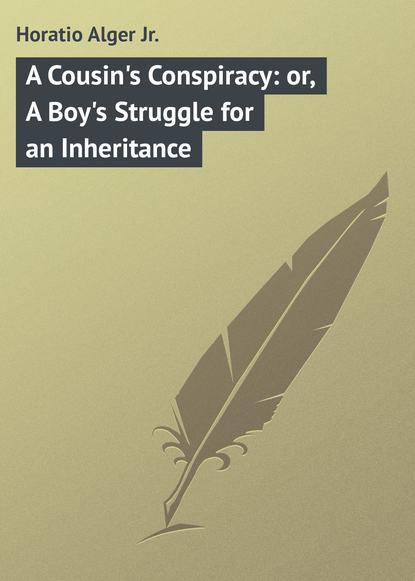По всем вопросам обращайтесь на: info@litportal.ru
(©) 2003-2025.
✖
A Cousin's Conspiracy: or, A Boy's Struggle for an Inheritance
Настройки чтения
Размер шрифта
Высота строк
Поля
“What made him get up so early?”
“’Portant business called him away.”
“Where’s Uncle John?”
“He hasn’t been home.”
“Has he got ’portant business too?”
“’Specs he has, honey.”
“It doesn’t seem nice to take breakfast without papa,” said the little boy.
“You may consider me your papa, Frank,” observed Ernest.
“But you’re not big enough to be a papa.”
When breakfast was over there was the long day before them to be filled up in some way.
“Don’t you ever wish to go out of the cave, Frank?” asked Ernest.
“Where?” asked the little boy.
“Into the bright sunshine, out on the green grass and under the trees.”
“Yes, I think I should like it,” answered Frank thoughtfully. “But papa does not want me to go. I don’t know why. Do many little boys live in caves like me?”
“No, I don’t think so.”
“Can they walk about in the sunshine and play?”
“I always did.”
“Do you like it better than living here?”
“Yes.”
“Then what made you come here?”
This was an embarrassing question and Ernest felt that he must answer carefully.
“Your papa wanted me to make you a visit,” he replied after a pause.
“And I am glad you came. It isn’t so lonely for me. Before I had only Juba.”
“Wouldn’t she play with you?” asked Ernest with a smile.
“Juba is too old to play. I hope you will stay with me a good while.”
Ernest could not echo this wish, so he answered evasively:
“I can’t tell yet how long I shall stay. But the time will come when you will leave the cave and live like other little boys in a house.”
“Did papa tell you that?”
“He told me that he should send you to school before long.”
“What is a school like?” asked the little boy anxiously.
“There will be a good many boys, some older, some younger than yourself. You will study lessons together and play together.”
“I think that will be nice.”
“Yes, I am sure you will enjoy it.”
“Did you ever go to school?”
“Oh, yes; I went to school for some years.”
“Perhaps you will go to school with me?”
“I can’t tell,” answered Ernest vaguely. “Perhaps Juba will go to school with you.”
Frank laughed.
“She would look funny going to school,” he said.
“What’s dat you sayin’ ’bout Juba, Massa Ernest?” asked the old woman.
“I told Frank you might go to school with him.”
“Maybe I’d go and take care of him, honey.”
“But you wouldn’t want to study?”
“I wouldn’t study nohow. I’s a poor, ignorant nigger.”
“Don’t you think you could learn to read?”
“No, I couldn’t. It takes white folks to read.”
“No; Juba, when I went to school there was a colored boy in my class, and he was one of the smartest scholars we had.”
“And was he a nigger?” asked Juba.
“We didn’t call him that, but he was a colored boy. If he could learn to read I am sure you could.”
“It’s no use, chile. I’m too old now.”











